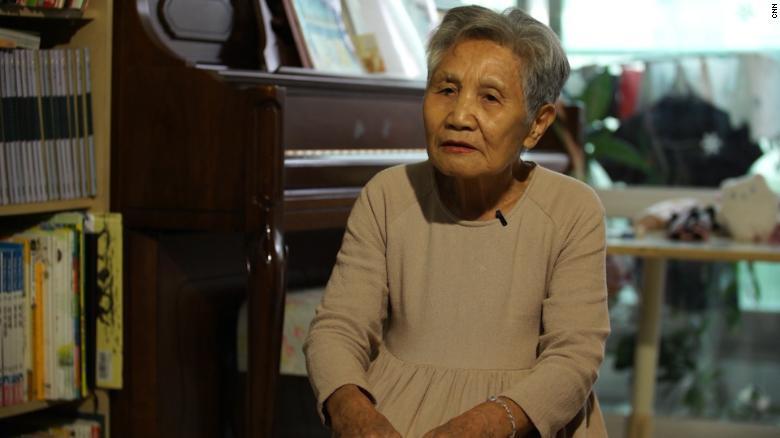'I cried for a year': Families split by the Korean War get rare chance to reunite
Seoul, South Korea (CNN)Lee Keum-seom hasn't held her son in 68 years.
The last time she saw him, Sang Chol was four years old, and together with her husband and their daughter, they were headed south, fleeing the fighting during the early days of the Korean War.
In the mass of hundreds of thousands of others trying to escape, Lee and her daughter lost sight of her husband and Sang Chol.
They continued south, becoming part of the flood of refugees who crossed what became the Demilitarized Zone. Only later did she discover that her husband and son remained on the other side of the divide, in North Korea.
They are among the tens of thousands of Koreans whose families were separated by the war.
Lee is now one of a small number of people fortunate enough to be chosen for government-run family reunions.
On Monday, the first reunion in three years will take place, at North Korea's Mount Kumgang. The reunion is included in the historic accord that was signed by the leaders of the two Koreas in April. Around 57,000 people were eligible to take part. Of those, 0.16%, just 93 people, have been selected.
Those left out face the agonizing prospect of never seeing their family members again. More than 75,000 people have already died without ever reuniting with their loved ones.
"When I came to the South, I realized that I won't see them again alive," Lee, now 92, said of her husband and son. "I thought to myself that the war needs to be over for us to meet. I gave up seeing them again."
Separation
Lee grew up in South Hamgyong province in what is now North Korea, where she got married and had two sons. The first died in infancy, but the second survived and she and her husband named him Sang Chol.
Lee was staying at her in-laws' home in Kapsan county when the war broke out on June 25, 1950, after months of rising tensions between the US-occupied South and Soviet-backed North Korea.
Their house was in remote countryside and little news ever reached their doors, but refugees running away from the fighting told Lee and her in-laws what had happened. "They were coming from deep in the mountains," she said. "They told us as they left that they were fleeing and that we should as well."
The family packed food and supplies onto an ox cart and headed south.
"We didn't get to go back to our house. We fled with just the clothes we wore for the trip. We kept walking and walking," she said. "Then we walked again. I needed to breastfeed my baby. But there were so many people on the road and in the houses by the road so there was no place to do it."
Seeking privacy, Lee crossed a small stream with her infant daughter, leaving her husband to look after the then four-year-old Sang Chol.
When she returned, the two had disappeared. Lee walked all day but couldn't find them, becoming more and more distressed but determined to keep searching.
"I continued on. I thought he must have gone all the way," she said. "I didn't stop to sleep or eat and kept going."
Eventually she came upon her brother-in-law, who told her they had been searching for her as well. Lee's husband had gone back to try and find her, but they had missed each other on the road in the crush of refugees.
She never saw her husband or son again.
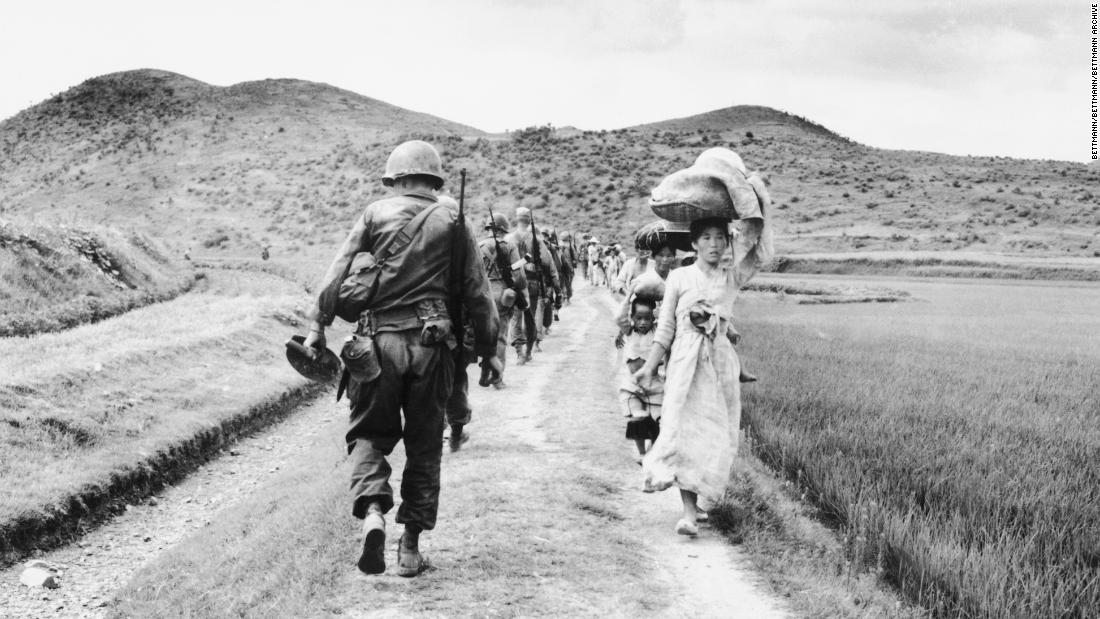
US soldiers pass fleeing refugees in the Nakdong River region, in what is now South Korea, during the Korean War.
Fleeing war
As Lee and her husband's family continued south, she clung onto hope that he and Sang Chol would catch up with them.
The fighting did instead. One night, as they were sheltering in an abandoned house, she was awoken by the sound of bullets.
"We were in a bad spot," she said. "We all lay down and stayed there."
Unable to sleep, she lay in the dark and listened to the battle, her eyes tightly shut. Eventually an announcement came that the fighting had stopped and civilians could board a train headed south.
The train was packed with refugees. Lee and her relatives threw their luggage onto the snow-topped roofs of the carriages and climbed on board themselves. They rode the train overnight to a port, where they were told to get on a ferry headed for Geoje Island.
In the chaos, Lee was separated from her in-laws again, and arrived in Geoje alone.
"I carried my baby," she said. "I found a wall and slept at the bottom of it hugging my baby."
A week passed before they reunited with some of her husband's family, who had also made it onto the ferry.
As new arrivals to Geoje, they were given a small amount of supplies as part of a South Korean government program to resettle refugees on the island, but were largely dependent on the limited generosity of the locals.
Lee spent many days longing for her husband and son, wondering what became of them and imagining the worst.
"After I woke up I would take my daughter out to the field and sit on a rock. That was my spot. And I would cry," Lee said. "I cried for a year."
As time wore on, Lee gave up on seeing her husband and son again. She remarried, to a man who had become separated from his wife and fled south with his daughters, who Lee raised as her own. Over time, she found she could remember little about Sang Chol, only that he was a good boy, who didn't complain.
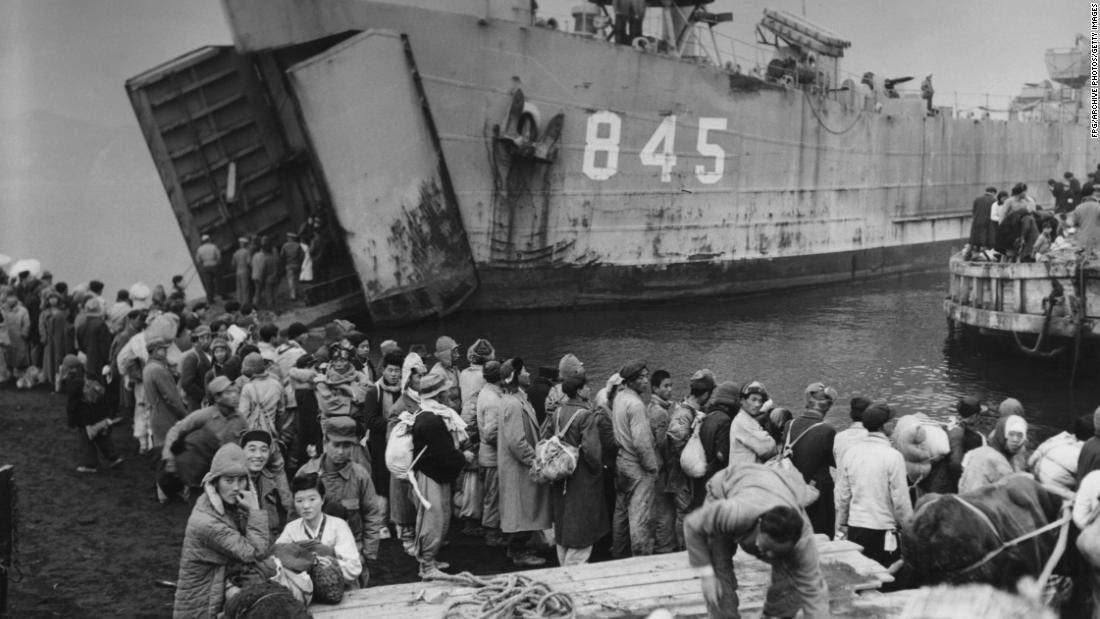
Civilians from Hungnam in North Korea board the landing ship USS Jefferson County as they flee their city during the Korean War on December 19, 1950.
Long wait
Sang Chol is now 72. After his father realized that they'd lost his mother on the chaotic road south, he took the boy back to their home village to find them. Few details are known about how Sang Chol's life unfolded in the reclusive country.
After 68 years, his mother Lee is about to find out.
Lee said she felt numb when she learned she had been selected to take part in Monday's family reunion.
"I couldn't process that at first. I couldn't believe that I was going to see my son," Lee said. "Will it be okay to hug my son who's over 70 years old?"
For most of the families split by the Korean War, their relatives are little more than vague memories to which they are connected by history and blood. Nevertheless, the loss and pain of the separation persists, as does the desire for reunion.
Hahm Seong-chan will be among the 93 people who meet their relatives on Monday.
His brother was around six years old when they last saw each other. They grew up in vastly different countries, with Hahm even working in South Korea for the US military, which remains widely loathed in North Korea for the brutal bombing campaign carried out during the war.
"I often thought it would be so nice if I could see my brothers just once before I die," he said. "When I got a phone call from the Red Cross that I made it to the first group of 500 out of over 50,000 applicants, I didn't think I would make it to the final list."
The 86-year-old told CNN he doesn't expect to recognize his younger sibling, who he can remember little about beyond that he was quiet and nice, unlike another brother who always used to get into fights.
"Maybe we'll be able to recognize each other because we share the same blood," he added. "Even if he doesn't remember me he must remember my name, 'Hahm Seong-chan.' I get so nervous thinking about that moment."
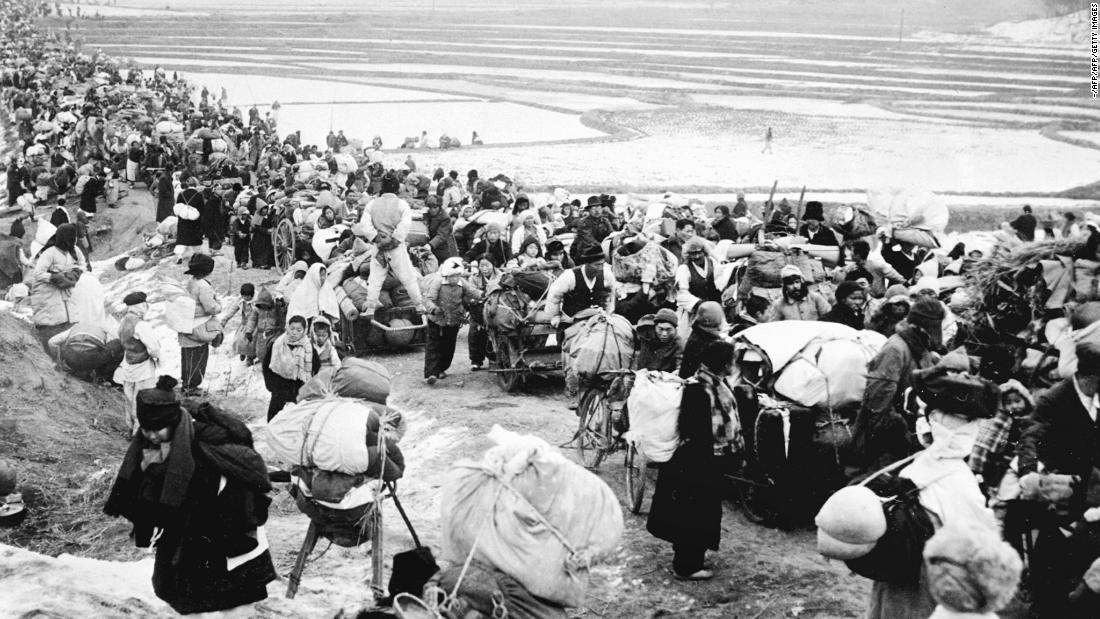
Picture taken on January, 18, 1951 shows Korean refugees fleeing to the south, as they pass by frozen rice fields.
Ongoing trauma
For many other separated families, the phone call confirming a reunion is yet to come.
Jung Kea-hyun, now 85, has applied 21 times for a reunion with his brothers, whom he became separated from in the war.
"I'm pining to see them again. People see their family again and cry their eyes out," he told CNN. "I cried a lot too."
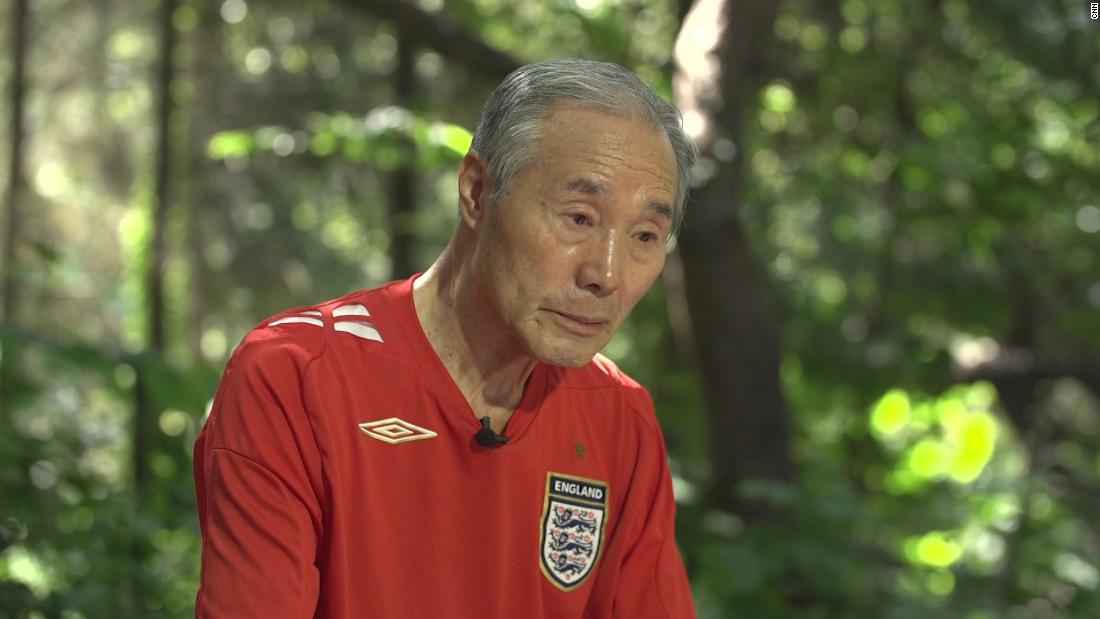
At 85, Jung Kea-hyun fears he will never see his brother, who lives in North Korea, before he dies.
While reports on reunions inevitably focus on the lucky few selected, Jung's situation is the reality for the vast majority of those who have applied.
"You need to experience it to know it. You can speak to me and hear the story, but have you ever been separated from your family? Imagine not seeing them for 65, 70 years," Jung said.
He struggled even to explain the hurt to his own wife, a native of Seoul who didn't experience the war in the same way: "If she was from the North too, I could talk to her about it. But it was pointless because she wouldn't know. She wouldn't know how I feel."
Every year, Koreans visit their hometowns to feast with relatives and pay respect to their ancestors as part of the Chuseok harvest festival. For Jung and many others, this happy occasion is an added heartbreak -- he can't visit the town of his birth, and his relatives on the other side of the DMZ may as well be a world away.
This year, as he has done for decades, Jung will get as close as he can, traveling to a shrine in Panmunjom, near the DMZ, where he will perform the traditional rituals.
"Being separated from your family is something unimaginable," he said. "What I want is not a one-off meeting. I want to know who is still surviving. Just to know if they are still alive. Or even just for the letters to travel back and forth."
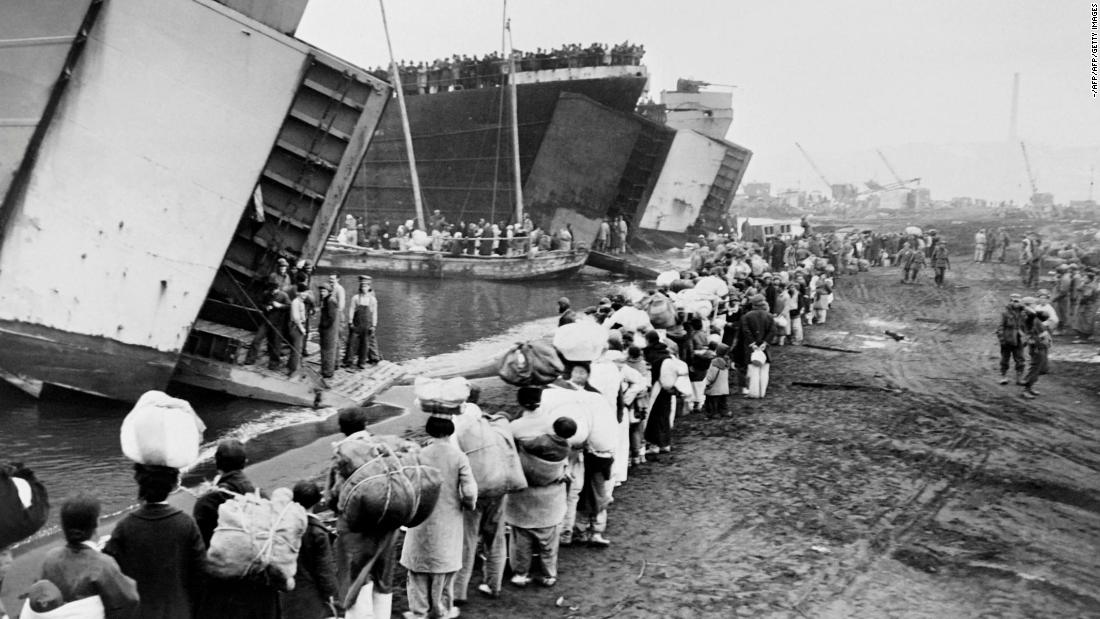
Picture released on December 26, 1950 of the evacuation of UN Command forces, including thousands of soldiers, civilians, vehicles and tons of supplies to Pusan from Hungnam port, during the Korean War.
For many families on both sides of the border, time is running out.
More than 75,000 applicants have died since the Korean Red Cross and state broadcaster KBS first began working to reunite families in the 1980s.
A flurry of reunions took place in the 2000s, amid improved relations between Seoul and Pyongyang, but then a lull followed as tensions rose again.
The last round of family reunions was in 2015. Now old and frail, many families fear they'll never be included on the list to meet their relatives, and even if they are they'll be too weak to make the journey north.
"The numbers selected will be very small," said Park Kyung-seo, president of the South Korean Red Cross, which organizes the reunions.
"I share fully with the disappointment of those who are not selected so I am trying with the North Korean partners to try and find other solutions, huge numbers are waiting."
"Imagine 73 years without knowing whether their family members are still alive or passed away -- no news at all," Park said. "The agony and anger, that's an unthinkable human tragedy."
This is the reality of the ongoing division of the peninsula, a division that for all the political bluster and fear of North Korean missiles heading to the US, affects ordinary Koreans more than anyone else.
"Even after the war, division caused the horror of war to take root in our everyday lives," South Korean President Moon Jae-in said last week as the country marked the 73rd anniversary of the end of Japanese colonialism.
"It took away the lives of countless young people, incurring enormous economic costs and loss of capabilities."
In September, Moon will travel to Pyongyang, where he and North Korean leader Kim Jong Un have pledged to continue to work "toward the declaration of an end to the Korean War and the signing of a peace treaty."
The families separated by that war, on both sides of the border, will be watching closely.
News Courtesy: www.cnn.com

